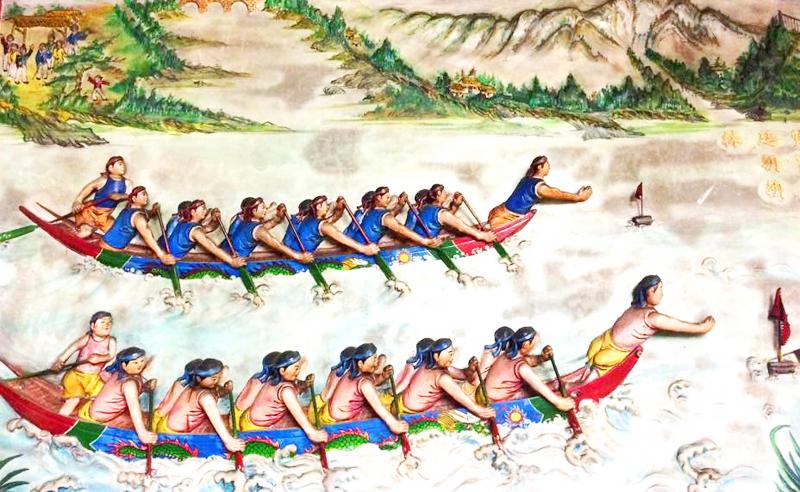June 29 to July 5
With women gathering rocks and men hurling them at thousands of rivaling neighbors, ritualistic stone battles were regular affairs for people living in Pingtung during the 1800s. Direct combat and use of weapons were prohibited to avoid serious injury, with the losers hosting the winners for dinner. These “guests” often acted rudely, and faced no repercussions for smashing windows or snatching their hosts’ possessions.
These battles usually took place yearly, with a significant number happening every Dragon Boat Festival. The winners had rights to the losers’ banquet prepared for the festivities.

Illustration: Yi-chun Chen
Sometimes things would get out of hand. One intense battle in the early 1900s resulted in the destruction of a house, which ignited a deadly gunfight. The villages decided to abolish the practice afterward, and soon, the Japanese colonizers stamped it out.
Early Han Chinese settlers in Taiwan were constantly at odds with each other, divided by place or origin in China or by clan. Disputes often ended in armed conflict, and scheduled rock fighting developed as a ritual to settle scores with less bloodshed. This phenomenon was common in Pingtung, Yunlin, Changhua and Taichung, writes Tai Pao-tsun (戴寶村) in an Historical Monthly (歷史月刊) article.
The people of Bengang (笨港) in today’s Chiayi County were among those who scheduled their bouts for Dragon Boat Festival. The Hsu clan (許) battled the joint forces of the Tsai (蔡) and Yang (楊) clans. The Hsus and Yangs were rivals in the peanut and sesame oil industry, but the Yangs had the support of the powerful Tsais, who controlled the port. The Chen (陳) clan also wielded considerable local influence, but stayed neutral.

Photo courtesy of Wikimedia Commons
One year, despite a malaria epidemic, infected villagers in Pingtung still braved the battlefield for their annual clash. Legend has it that their symptoms subsided after heavy sweating, and they attributed their miraculous recovery to the battle. Later on, people began believing that participation in the fight would give them a peaceful and healthy year; some even believed that if they did not have a rock fight, disaster would befall the entire area.
Since armed warfare still broke out between villages, the stone fights were also a way to keep the villagers ready for battle.
“The participants were like an army brigade. They trained all year under a commander, and as soon as it was Dragon Boat Festival, the entire village mobilized quickly,” writes Seiichiro Suzuki in the book Taiwan’s Past Customs and Beliefs.
Those who were captured fleeing the battlefield were punished by being stripped of their pants, and the injured would shamefully leave town to treat their wounds.
The Japanese saw stone fighting as one of the “bad habits” that they had to rid the Taiwanese of when they arrived in 1895. A 1909 report shows a police force dispersing a bout after it raged on for days.
“To completely uproot these vulgar practices, we must hold more youth sports competitions during Dragon Boat Festival,” writes Suzuki. It was already 1934, and he writes that while the rock fights have been mostly curbed, small-scale ones still occasionally break out.
LORD OF WATERS
The ancient Chinese poet and bureaucrat Qu Yuan (屈原) allegedly drowned himself in despair over the emperor’s disastrous policies. To prevent his body from being devoured by fish, saddened locals threw glutinous rice dumplings called zongzi (粽子) into the river. To honor his memory, the people would eat zongzi on the anniversary of his death, and dragon boat races developed from them sailing up and down the river trying to find his body.
But some experts say that the people of southeast China had been holding dragon boat races around the same time long before Qu’s death to ward off evil and mark the beginning of summer.
Nevertheless, Qu is worshipped in Taiwan among the Taoist pantheon’s water gods. There is only one temple with him as the main deity in the nation: Zhoumei Quyuan Temple (洲美屈原宮) in Beitou, and it’s the only water god temple that still holds dragon boat races.
Temple annals state that the effigy of Qu Yuan was brought to Taiwan in 1721 by a Chinese sailor answering the rebel Chu Yi-kuei’s (朱一貴) calls for reinforcements. It’s not clear whether he brought Qu Yuan as the patron deity of his village, or for good luck on the perilous journey across the Taiwan Strait.
Chu’s uprising failed, and the effigy ended up in the Zhoumei community. The villagers cast divination blocks during a yearly ceremony to decide who would house it, and it went from house to house for the next two centuries until the community built it a permanent home in 1980.
Locals claim that Zhoumei’ dragon boat race is the oldest in Taipei. At the very least, historical records show that it was going on before 1884. During the Japanese era, the village was divided into northern and southern halves to compete against each other.
Dragon Boat Festival remains a big deal in Zhoumei and the temple and community hosts one of the larger celebrations.
Taipei Mayor Ko Wen-je (柯文哲) personally dotted the eyes of the dragon boat earlier this month to kick off the festivities, continuing centuries of tradition — minus the rock fights.
Taiwan in Time, a column about Taiwan’s history that is published every Sunday, spotlights important or interesting events around the nation that have anniversaries this week.

Jacques Poissant’s suffering stopped the day he asked his daughter if it would be “cowardly to ask to be helped to die.” The retired Canadian insurance adviser was 93, and “was wasting away” after a long battle with prostate cancer. “He no longer had any zest for life,” Josee Poissant said. Last year her mother made the same choice at 96 when she realized she would not be getting out of hospital. She died surrounded by her children and their partners listening to the music she loved. “She was at peace. She sang until she went to sleep.” Josee Poissant remembers it as a beautiful

March 2 to March 8 Gunfire rang out along the shore of the frontline island of Lieyu (烈嶼) on a foggy afternoon on March 7, 1987. By the time it was over, about 20 unarmed Vietnamese refugees — men, women, elderly and children — were dead. They were hastily buried, followed by decades of silence. Months later, opposition politicians and journalists tried to uncover what had happened, but conflicting accounts only deepened the confusion. One version suggested that government troops had mistakenly killed their own operatives attempting to return home from Vietnam. The military maintained that the

Before the last section of the round-the-island railway was electrified, one old blue train still chugged back and forth between Pingtung County’s Fangliao (枋寮) and Taitung (台東) stations once a day. It was so slow, was so hot (it had no air conditioning) and covered such a short distance, that the low fare still failed to attract many riders. This relic of the past was finally retired when the South Link Line was fully electrified on Dec. 23, 2020. A wave of nostalgia surrounded the termination of the Ordinary Train service, as these train carriages had been in use for decades

Lori Sepich smoked for years and sometimes skipped taking her blood pressure medicine. But she never thought she’d have a heart attack. The possibility “just wasn’t registering with me,” said the 64-year-old from Memphis, Tennessee, who suffered two of them 13 years apart. She’s far from alone. More than 60 million women in the US live with cardiovascular disease, which includes heart disease as well as stroke, heart failure and atrial fibrillation. And despite the myth that heart attacks mostly strike men, women are vulnerable too. Overall in the US, 1 in 5 women dies of cardiovascular disease each year, 37,000 of them